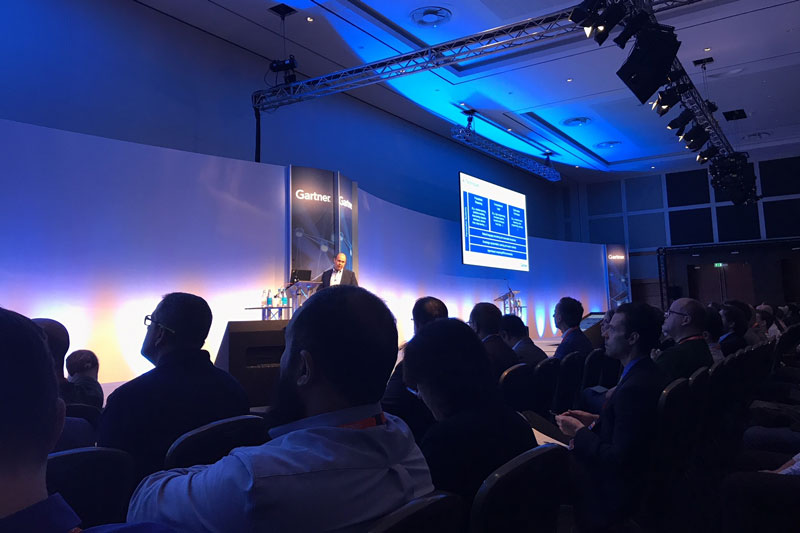Every March, Gartner kicks off its yearly round of Data & Analytics Summits in Dallas, followed by another show two weeks later in London. These events bring a combined total of more than 5,000 data and analytics professionals together to learn about the latest trends and technologies in this space.
Tweet: Takeaways from the 2018 Gartner Data & Analytics Summit
Having attended the Dallas summit for the past two years, I decided to check out the London summit this year. Here are some of my top takeaways from the event.
Trust is paramount
With all the news about “fake news”, it’s important that we all trust the information we are consuming. That doesn’t mean just media – it also means the data that we analyze every day in our jobs. Unfortunately, Gartner doesn’t have high hopes for the future of trustworthy news. Here are two predictions it made in the opening keynote:
- By 2022, the majority of individuals in mature economies will consume more false information than true information.
- Through 2021, AI-driven creation of “counterfeit reality,” or fake content, will outpace AI’s ability to detect it, fomenting digital distrust.
Some sobering predictions about “fake news” #GartnerDA pic.twitter.com/clQzyFzqi4
— Kathy Sucich (@ksucich) March 19, 2018
I’m glad that Gartner has started to emphasize the importance of trustworthy data. It’s something that we at Dimensional Insight incorporated into our product from our inception. In recent years, it seemed that trust in data took a back seat to user adoption. It’s true that widespread user adoption and slick visuals are important. However, they need to be built upon a solid, trusted foundation from which you can make decisions.
AI and augmented analytics
Business intelligence is dead. Well, that may a bit of a stretch. But “modern BI” was certainly no longer the focus at the event. It was clear at the show that Gartner is shifting its focus from the BI world to the AI world.
In 2021, AI augmentation will create $2.2 trillion of business value and 6.2 billion hours of worker productivity #gartnerDA pic.twitter.com/0UnHYW2Dy0
— DataRobot (@DataRobot) March 21, 2018
You can do wrong but you can also do a lot of good with data & AI. says @ayeshakhanna1 > I agree #data4good #GartnerDA
— Cindi Howson (@BIScorecard) March 21, 2018
Gartner discussed the fundamental shift in which technology is moving from enabling manual processes done by few people to automated processes done by many people. Artificial intelligence is not only one area in which businesses are gaining funding for, but also one in which organizations are looking to invest their resources and talent. In fact, the Gartner 2018 CIO Survey indicates that only 14% of businesses have absolutely no interest in AI.
Augmented analytics is another area that Gartner anticipates will help in making analytics more widespread through organizations. Gartner defines augmented analytics as an approach that uses machine learning and natural-language generation to automate insights. It is essentially when the machine tells you what you should be looking at by analyzing the data instead of you figuring out where to look.
Take all of this with a grain of salt, though. One Gartner analyst said at the conference that AI will not deliver substantive business results for at least three years.
The importance of data literacy
According to Gartner, augmented analytics will also help improve data literacy among users. Data literacy involves creating a culture around data in which everyone feels empowered to make decisions.
At #GartnerDA now, @vloganinfo is explaining how crucial employee #data literacy is to business success in today’s world – these #CDO survey results underline her thinking! pic.twitter.com/IyxktxE3y8
— Gartner Events (@Gartner_Events) March 21, 2018
In order to improve data literacy, Gartner advocates providing training in context. This means making power users more accessible to business users “on the ground” as opposed to in a training room. Gartner also advocates creating a certification system for analytics, similar to a driver’s license.
Conference odds and ends
- Gartner also emphasized the importance of diversity in organizations. This referred to diversity not only among people (gender, race, walks of life), but also diversity of data sources and diversity of roles in making decisions. June Sarpong, author of Diversify, delivered a keynote in which she spoke about the value of diversity in organizations. I’ll be writing more about this in an upcoming blog post.
- Another keynote speaker was Matt Walker, researcher at the University of California, Berkley, and author of Why We Sleep. As someone interested in the data of sleep (According to my Fitbit, I sleep an average of 6 hours, 43 minutes per night and dream more than the average person), I found Walker’s keynote fascinating. Walker talked not only about the importance of sleep as it relates to physical health, but also about how less sleep results in less productivity at the office. For example, sleep-deprived workers have fewer creative solutions to problems, don’t work as well in groups, are more likely to show deviant behavior, and are less charismatic than those who get enough sleep. Don’t be surprised if you see Walker’s book as a future selection in the Dimensional Insight Book Club.
- This was my first trip to London, and I had the fortune (misfortune?) of going during a rare moment of snow. All in all, a fun trip in which I was able to see the big sights of the city and learn about the latest trends in data and analytics.
- Solving Hospital CEOs’ Pressing Challenges With Analytics - April 15, 2024
- Navigating the Wellness Wave: Wine & Spirits Data Strategy - April 9, 2024
- Takeaways from HIMSS24 - March 26, 2024



